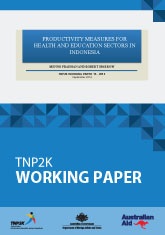Productivity Measures for Health and Education Sectors in Indonesia
Working Paper 15
September 2014
Authors: Menno Pradhan and Robert Sparrow
This study analyses the relative efficiency of district public health and education service delivery in Indonesia over the period 2003 to 2008. We apply production frontier models to assess the efficiency of districts in achieving education and health outputs, and costs functions to assess the efficiency of public spending. The analysis combines data from the Ministry of Finance on district spending, Susenas household surveys, and health and education infrastructure indicators from the PODES village census.
The data show a strong increase in district health and education public spending, as well as service availability. Yet, we also see a large disparity in spending between districts in terms of per capita public spending, both within and between regions. To a large extent this is driven by relatively static characteristics of districts. However, there is some evidence of convergence in spending levels as well as scope for local policy changes to overcome initial public spending differences. This suggests that the central government transfers remain an important policy tool for equalizing investment in health and education in districts.
The analysis reveals substantial variation in efficiency across regions in Indonesia. Given the level of service delivery, district public spending per capita is on average relatively low in Java and Bali. In contrast, Sulawesi and Kalimantan are relatively less efficient in terms of spending, while in Sumatra spending efficiency by district governments has declined strongly since 2006. Districts in Java and Bali also perform well in terms of technical efficiency, as service delivery in these districts is relatively high, given the level of spending and available infrastructure.
The TNP2K Working Paper Series disseminates the findings of work in progress to encourage discussion and exchange of ideas on poverty, social protection and development issues.
Support for this publication has been provided by the Australian Government through the Poverty Reduction Support Facility (PRSF).
The findings, interpretations and conclusions herein are those of the author(s) and do not necessarily reflect the views of the Government of Indonesia or the Government of Australia.
You are free to copy, distribute and transmit this work, for non-commercial purposes.
Suggested citation: Sparrow, R., and M. Pradhan. 2014. ‘Productivity Measures for Health and Education Outcomes in Indonesia’. TNP2K Working Paper 15-2014. Jakarta, Indonesia: Tim Nasional Percepatan Penanggulangan Kemiskinan (TNP2K).
To request copies of the paper or for more information on the paper, please contact the TNP2K -Knowledge Management Unit (kmu@tnp2k.go.id). The papers are also available at the TNP2K website.
